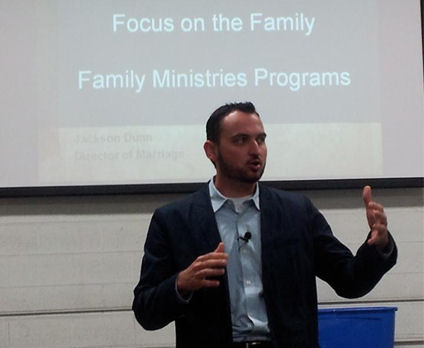
Marriage Mentoring – A New Approach to Building Healthy Families.
In December, 2013, Focus on the Family’s Director of Marriage Jackson Dunn recently spoke at numerous locations across West Michigan. During this three day, multi-stop working visit, he met with business leaders at National Nail Corporation, with married couples at Cornerstone Church, and with men at His Barn ministries in Byron Center. During his visit, I chatted with Dunn about his skills, and the fresh approach to marriage ministry he brought to Focus on the Family (FOTF).
Dunn worked at John Brown University as a resident director from 2005 to 2011. He completed his post-grad work at JBU’s Center for Relationship Enrichment, which uniquely prepared him for the role of Direct of Marriage at FOTF. Tasked with creating intentional marriage and relationship training at one of the nation’s largest, strongest pro-family ministries, Dunn wants to change the focus from books, classes and conferences to relationship centered mentoring. The difference, according to Dunn, is essential for rebuilding the American family, and restoring stability back into our homes and communities via healthy families. His goal is to work with “reckless abandon and open hands.”
The church’s traditional approach to training is programs and curriculum. Even though FOTF pioneered marriage building books, programs and curriculum over the past four decades, Dunn sees a flaw in that approach. In a classroom approach, churches teach on a topic for 6-12 weeks and then “announce” that the students are equipped to take on the challenges of marriage and family.
According to Dunn, mentoring requires communicating lifestyle and life skills. Mentoring involves books, tapes and resources, but it focuses on assimilating the lessons into one’s own character rather than filling in the blanks at the end of a classroom session. Mentoring also needs metrics, as does any educational program. Metrics provide a measure of the accomplishments, but the metrics aren’t the goal. In mentoring, the big vision is that every person has a story to tell that can benefit the next generation. By sharing experiences and lifestyle in the context of relationships, Dunn believes we communicate values, lifestyle and a stable culture from one generation to the ensuing.
Mentoring is based on one person’s story and experience, and their contribution is poured into another person’s or couple’s life. Because mentoring is so personal, Dunn said that those with a story and expertise to share often shrink back. The average, successful and mature Christian feels . . . well . . . just average. He or she doesn’t believe that they have anything to share. They’re not experts. They’re not perfect, and too often they just don’t have the time to build relationships outside of their own work and family. Yet this personal approach, sharing a life story with it’s ups and downs, struggles and triumphs, is the heart of mentoring.
By focusing on mentoring, Dunn accepts that people aren’t perfect, and they don’t’ have to be. Some of the value that a mentor brings to a relationship is the imperfections in their own life. As the Apostle Paul said, when we are imperfect, the glory of God can shine through our lives more clearly. The purpose of mentoring isn’t creating plastic, phony masks that a couple wears to pretend everything is OK. Mentoring creates a genuine community, which meets relational needs by sharing experience, compassion and grace in the context of community, or a longer term, mentoring relationship.
The classroom model has become so prevalent because experienced Christ-followers often let their schedules and their fears set their agendas, and thus the default is the classroom model. Our churches host four-week marriage preparation seminars, and eight week discipleship classes, and then leave the graduates to fend for themselves. Too often this approach results in protecting what we have (knowledge and expertise) rather than pouring the life experience from one generation into another in order to create lasting life change.
According to Dunn, the other downfall of a classroom approach to discipleship and marriage is that in a classroom, with prepared materials and a pre-scripted lesson, churches can fall out of touch with the community around them. When a church employs the same traditions and falls back to the same cultural reference point for more than ten years, that church will likely find that the community around them has changed, and their life-changing message is becoming more irrelevant as the calendar marches on.
Dunn believes that a mentoring approach to marriage, family and relationships bridges this potential “generation gap.” Mentoring communicates to the culture based on what they understand, and what they accept. If you are interested in what Focus on the Family is putting together to build healthy marriages into the 21st century, contact Jackson Dunn, and find out more about Focus on the Family’s renewed Gen3 Marriage Strategy here: Jackson.dunn@fotf.org.